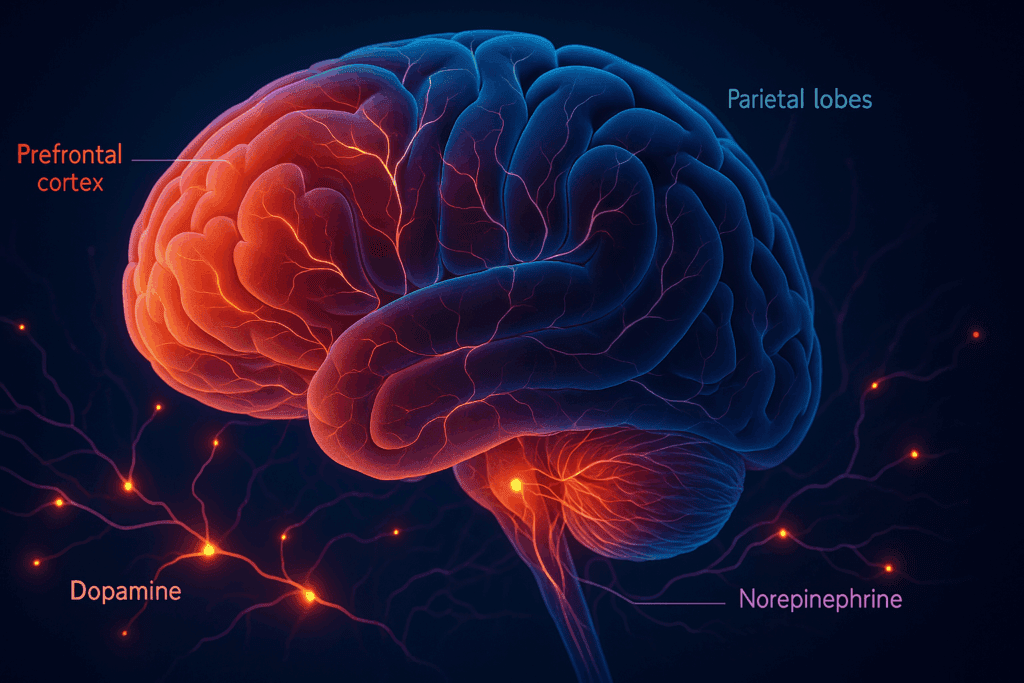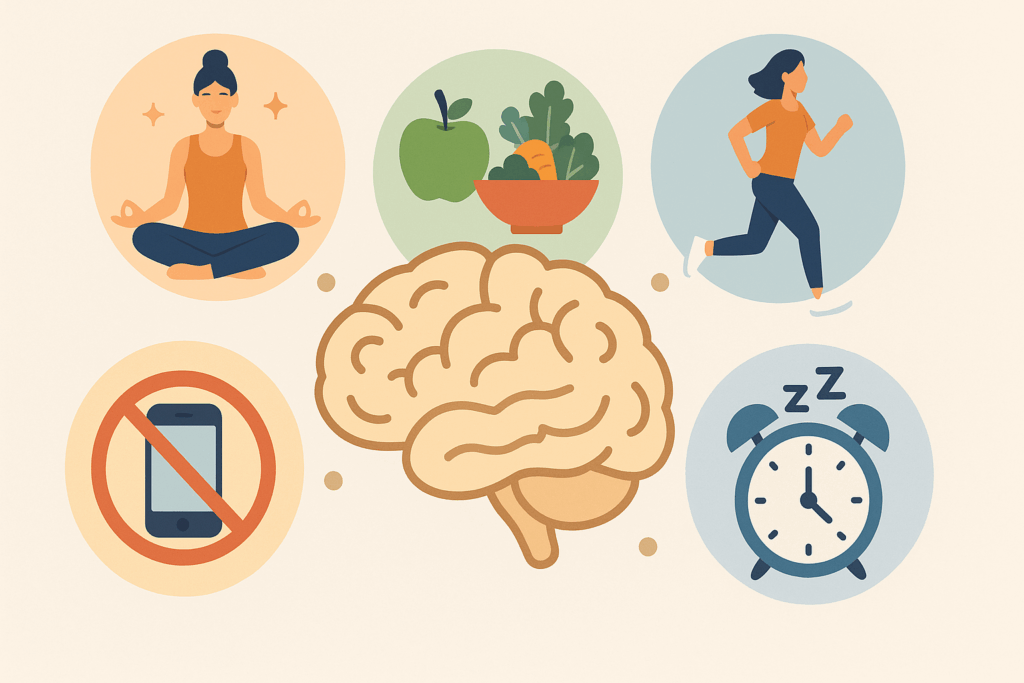Introduction: Understanding the Importance of Attention in a Distracted World
In a world that constantly bombards us with information, the ability to concentrate and sustain focus has become not just a personal asset, but a professional necessity. Attention span—the duration for which a person can maintain focus on a task without becoming distracted—is increasingly compromised by digital distractions, multitasking habits, and information overload. The modern environment is replete with alerts, notifications, and rapidly changing stimuli that tax our cognitive resources and shorten our ability to remain engaged. This decline in attentional capacity can hinder productivity, learning, emotional regulation, and even interpersonal relationships.
You may also like: How to Improve Focus and Concentration: Proven Techniques for Boosting Mental Clarity and Productivity
While some may dismiss a waning attention span as a minor nuisance, neuroscience suggests otherwise. Attention is intricately linked to broader cognitive functions such as memory, executive functioning, and decision-making. Disruptions in attention do not just affect moment-to-moment focus; they have long-term consequences on brain health and overall cognitive resilience. As such, exploring strategies to boost attention span is not simply a matter of convenience, but of safeguarding mental performance and promoting brain longevity.
This article aims to provide science-backed, actionable insights for those wondering, “How can I improve my attention span?” It delves into evidence-based practices drawn from cognitive neuroscience, psychology, and nutritional science, offering a roadmap for enhancing attentional control naturally and sustainably. Whether you’re struggling with task-switching fatigue, memory lapses, or general brain fog, this comprehensive guide will equip you with the tools to improve focus and support long-term cognitive health.

The Neuroscience Behind Attention: How Focus Works in the Brain
To understand how to improve your attention span, it is first essential to explore how attention works in the brain. Attention is not a singular cognitive process, but rather a complex interplay of multiple neural networks and neurotransmitter systems. At its core, attention involves the prefrontal cortex—the brain region responsible for planning, decision-making, and impulse control. This region works in tandem with the parietal lobes and thalamus to filter relevant information from distractions.
Neurotransmitters such as dopamine and norepinephrine play a critical role in modulating attention. Dopamine, in particular, is associated with reward-motivated behavior and the ability to sustain focus over time. When dopamine levels are optimal, individuals tend to experience heightened alertness and mental stamina. Conversely, dopamine dysregulation—commonly observed in attention-deficit conditions—can result in distractibility, impulsivity, and mental fatigue.
Functional MRI studies have demonstrated that attention is not only localized to one region but rather distributed across what are known as attentional networks. These include the dorsal attention network, which governs voluntary, goal-directed attention, and the ventral attention network, which is responsible for detecting unexpected stimuli. Effective attentional control depends on the dynamic regulation between these networks, allowing us to stay focused while remaining responsive to important changes in our environment.
Understanding the brain’s architecture helps illuminate why sustained attention can be challenging and highlights why strategies for improvement must be multifaceted. By targeting specific aspects of neural function—whether through behavioral training, nutritional support, or cognitive exercises—individuals can enhance their attentional networks and boost their overall capacity to focus.

Nutrition and Brain Health: Eating to Improve Attention Span
Cognitive function is deeply influenced by dietary habits, making nutrition one of the most potent yet underutilized tools for enhancing attention. Nutrients serve as building blocks for neurotransmitters and structural components of brain cells, directly impacting cognitive processes such as memory, alertness, and focus. For those asking how they can improve their attention span naturally, the first place to look is often on their plate.
Omega-3 fatty acids, found abundantly in fatty fish such as salmon, sardines, and mackerel, are essential for maintaining neuronal membrane fluidity and facilitating communication between brain cells. Numerous studies have linked higher omega-3 intake with improved attention and reduced symptoms of ADHD in both children and adults. Similarly, B vitamins—including B6, B9 (folate), and B12—are vital for neurotransmitter synthesis and myelin production, supporting optimal brain signaling and energy metabolism.
Antioxidant-rich foods such as blueberries, dark leafy greens, and turmeric combat oxidative stress, a key contributor to cognitive decline and attentional deficits. Polyphenols found in green tea and cocoa have also been shown to enhance blood flow to the brain and stimulate neurogenesis, thereby supporting sustained mental focus. Caffeine, when consumed in moderation and paired with L-theanine (as found in green tea), can provide a calm but alert state conducive to focused work.
Conversely, diets high in processed sugar, trans fats, and refined carbohydrates are associated with impaired attention and slower cognitive processing. These foods can cause blood sugar fluctuations that disrupt mental clarity and energy levels. Adopting a Mediterranean-style or anti-inflammatory diet that emphasizes whole foods, healthy fats, and lean proteins can help stabilize mood, improve energy, and ultimately boost attention span.
Incorporating these nutritional strategies into daily life offers a practical and effective way to support brain health. By making deliberate food choices, individuals can nourish their neural networks and enhance their capacity to concentrate, laying the foundation for improved cognitive performance.


Frequently Asked Questions: Improving Attention Span
1. Can mindfulness meditation really help me boost attention span in the long term?
Absolutely, mindfulness meditation is one of the most researched and effective ways to boost attention span naturally. While the main article touched on neural function, what’s especially compelling is how mindfulness reshapes attention regulation through neuroplasticity. Long-term meditators show increased cortical thickness in the anterior cingulate cortex, a region deeply involved in attention control and error detection. Over time, consistent meditation practice not only improves moment-to-moment focus but also enhances the ability to notice when attention wanders, allowing for quicker re-engagement with tasks. If you’re asking “how can I improve my attention span sustainably?” a structured mindfulness regimen—beginning with as little as 10 minutes per day—can rewire the brain for lasting focus.
2. How does social media impact my ability to concentrate throughout the day?
Excessive social media use trains the brain to expect rapid, high-reward feedback, which undermines sustained focus. It conditions users to seek constant novelty, thereby weakening the mental stamina needed for deep work. If you’re trying to understand how to increase your attention span, minimizing your exposure to algorithm-driven content is a powerful step. Social media’s infinite scroll hijacks the brain’s reward systems, reinforcing impulsive attention switching. To boost attention span, consider implementing digital hygiene practices like app usage time limits or grayscale screen settings, which reduce the dopamine-driven allure of social feeds.
3. Are there emerging technologies that could help me train my brain to focus better?
Yes, neurofeedback and digital cognitive training platforms are rapidly evolving to help individuals enhance their cognitive control. These tools offer real-time brainwave feedback or adaptive exercises targeting specific attentional networks. While more research is still needed to evaluate their long-term efficacy, early evidence suggests they can boost attention span in both clinical and non-clinical populations. For anyone exploring how to increase their attention span through modern tools, combining these technologies with behavioral interventions often yields the best results. Some devices even integrate with mobile apps, offering accessible, gamified brain training tailored to your cognitive profile.
4. How can I improve my attention span during emotionally stressful periods?
Stress severely narrows cognitive bandwidth, making it difficult to retain focus, especially on non-urgent tasks. In such situations, incorporating emotion regulation strategies—like cognitive reappraisal, deep breathing, or journaling—can restore mental clarity. Rather than forcing yourself to focus during high-stress moments, it’s often more productive to address the emotional disruption first. Understanding that emotional well-being is a prerequisite for sustained attention can shift your approach from guilt-driven willpower to supportive self-regulation. So if you’re asking how to improve your attention span during adversity, prioritize emotional resilience as a foundational component of cognitive control.
5. Is physical activity linked to better focus, and if so, how much is needed?
Yes, physical activity has a profound impact on executive function and attentional stability. Aerobic exercise increases levels of brain-derived neurotrophic factor (BDNF), a protein that supports neuronal health and cognitive function. Studies suggest that even short bouts—like 20 minutes of brisk walking—can immediately enhance focus for up to two hours. Over time, regular movement improves working memory and processing speed, both of which are crucial for sustained attention. For those wondering how to increase attention span through lifestyle habits, a consistent fitness routine—particularly one that includes rhythmic, endurance-based movement—can offer surprisingly strong cognitive benefits.
6. What role does sleep architecture play in my ability to concentrate?
While sleep quantity is important, sleep architecture—meaning the composition and cycling of sleep stages—plays a more intricate role in attention. Deep sleep (slow-wave sleep) helps with memory consolidation, while REM sleep fosters emotional regulation and creative problem-solving. Fragmented or shallow sleep reduces alertness and lowers dopamine receptor sensitivity, directly impairing focus. If you’re searching for how to improve your attention span naturally, optimizing both sleep duration and quality should be a top priority. Using a consistent sleep schedule and avoiding blue light in the evening can help restore healthy circadian rhythms, thus supporting better daytime concentration.
7. Can certain hobbies or creative activities help boost attention span over time?
Surprisingly, yes—especially those that demand flow-state engagement. Activities like playing a musical instrument, painting, or even intricate crafts like origami require sustained, undivided attention. These hobbies not only exercise the brain’s attentional networks but also build mental endurance by fostering intrinsic motivation. If you’re curious about how to increase your attention span through enjoyable means, consider picking up a creative pursuit that naturally encourages immersion. Over time, the focused mental states these hobbies cultivate can transfer into other areas of life, including work and study.
8. How do age-related changes affect attention span, and what can be done about it?
As we age, processing speed and working memory tend to decline, which can make sustained attention more difficult. However, neuroplasticity remains intact well into older adulthood, meaning that cognitive training, lifestyle adjustments, and proper nutrition can still yield significant improvements. Engaging in cognitively stimulating activities—such as learning a new language or solving complex puzzles—helps preserve attentional capacity. For older adults asking how they can improve their attention span, the key lies in consistency and novelty. Adopting new mental challenges, rather than relying on routine, can help maintain a sharp, agile mind.
9. What’s the connection between purpose-driven work and sustained focus?
Tasks that align with personal values and long-term goals often elicit higher levels of intrinsic motivation, which in turn fuels attention. When you believe your work matters, it activates the mesolimbic dopamine system, sustaining engagement over longer durations. If you’re exploring how to boost attention span in professional or academic contexts, reevaluating the purpose behind your work can be a transformative step. Identifying meaningful outcomes shifts your mindset from obligation to opportunity, dramatically improving attentional stamina. Purpose-driven individuals often report entering flow states more easily, where concentration becomes effortless and deeply fulfilling.
10. Are there social or environmental changes I can make to enhance my attention span?
Absolutely. Your physical and social environments profoundly shape your cognitive performance. Cluttered workspaces, poor lighting, and constant interruptions degrade attentional stability. Conversely, organizing your environment to minimize distractions—such as using noise-canceling headphones or creating a visual priority system—can dramatically boost attention span. Socially, surrounding yourself with focused, goal-oriented individuals can subtly reinforce your own habits through a phenomenon known as behavioral contagion. So if you’re asking how can I increase my attention span in everyday settings, consider both the physical cues and social influences that affect your ability to focus.

Conclusion: Enhancing Focus for a Lifetime of Cognitive Vitality
In a world where distractions are ever-present and cognitive demands are higher than ever, taking proactive steps to improve your attention span is both a personal and public health imperative. The question of how to improve attention span—posed increasingly by students, professionals, and aging adults alike—reflects a broader societal shift toward mental optimization and brain longevity. Through a multifaceted approach that integrates nutritional support, behavioral strategies, environmental design, and evidence-based cognitive training, individuals can reclaim their focus and cultivate a brain that is resilient, sharp, and attentive.
Those who seek to boost attention span will find no shortage of tools at their disposal, but the key lies in consistency, personalization, and scientific grounding. What works for one person may require adaptation for another, underscoring the value of self-awareness and iterative experimentation. However, the foundational principles remain universal: nourish the brain with quality foods, protect it from overstimulation, train it through deliberate practice, and rest it through quality sleep and recovery.
Investing in attention is not merely about boosting productivity or achieving peak performance—it is about enhancing the quality of our thoughts, relationships, and life experiences. Attention is the gateway to presence, learning, and meaning. By prioritizing cognitive health and employing strategies to improve attention span, we not only sharpen our minds but also enrich our capacity to engage with the world around us.
Ultimately, the journey to greater focus is not a sprint but a lifelong pursuit. As we continue to discover new insights into how the brain works, our strategies will evolve—but the goal will remain the same: to live with clarity, purpose, and sustained mental vitality.
improving focus naturally, cognitive enhancement strategies, attention training techniques, mental clarity tips, brain performance optimization, natural concentration boosters, ways to stay mentally sharp, focus improvement exercises, cognitive health habits, neuroplasticity and attention, brain-boosting lifestyle changes, managing digital distractions, executive function support, staying focused while studying, techniques for deep work, brain longevity practices, daily habits for better focus, attention span and aging, lifestyle tips for mental sharpness, productivity and cognitive function.
Further Reading:
14 Tips to Improve Your Concentration
How to improve concentration and focus—our 15 best tips
Disclaimer
The information contained in this article is provided for general informational purposes only and is not intended to serve as medical, legal, or professional advice. While Health11News strives to present accurate, up-to-date, and reliable content, no warranty or guarantee, expressed or implied, is made regarding the completeness, accuracy, or adequacy of the information provided. Readers are strongly advised to seek the guidance of a qualified healthcare provider or other relevant professionals before acting on any information contained in this article. Health11News, its authors, editors, and contributors expressly disclaim any liability for any damages, losses, or consequences arising directly or indirectly from the use, interpretation, or reliance on any information presented herein. The views and opinions expressed in this article are those of the author(s) and do not necessarily reflect the official policies or positions of Health11News.


